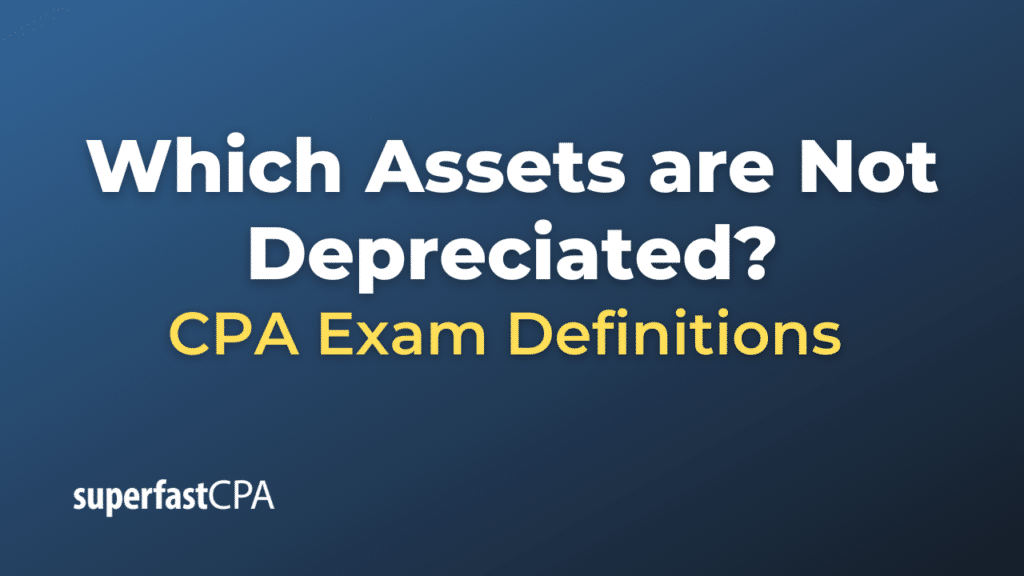Which Assets are Not Depreciated
In accounting, certain types of assets are not subject to depreciation for various reasons, including the nature of the asset, how it’s used in the business, or specific accounting rules and regulations. Here’s a rundown of some of the main categories of assets that are generally not depreciated:
Land
Land does not have a finite useful life and therefore is not depreciated. However, any buildings or structures on the land are depreciable.
Intangible Assets (Sometimes)
Some intangible assets like patents, copyrights, and trademarks can be amortized over their useful lives, which is similar to depreciation but for intangibles. However, certain intangible assets like goodwill are not amortized unless they have a finite useful life or are impaired.
Financial Assets
Investments in stocks, bonds, or other financial instruments are not depreciated. These assets are generally carried at fair market value.
Raw Materials and Inventory
Items that are planned to be sold or used up in the production process are not depreciated. They are instead expensed as cost of goods sold when the inventory is sold or used.
Works of Art, Historical Treasures, and Similar Assets
In some cases, works of art, historical treasures, or other valuable items that are part of a collection may not be depreciated if they are held for public exhibition, education, or research rather than financial gain.
Livestock
In agricultural settings, certain animals considered livestock might not be depreciated, depending on tax jurisdiction and other factors. They might instead be valued at their market value.
Temporary Assets
Some assets are so short-lived that they are not capitalized and depreciated. These are usually expensed as incurred.
Investments in Subsidiaries
Investments in subsidiaries or joint ventures are not depreciated but may be tested for impairment. The equity or cost method is usually applied for these types of investments.
Certain Intangible Assets with Indefinite Lives
Goodwill and certain other intangible assets that have an indefinite useful life are not regularly amortized but are subject to annual impairment tests.
Each type of non-depreciable asset is treated differently in accounting, so it’s important to understand the rules and conventions applicable to your jurisdiction and industry. Always consult financial advisors or accountants to ensure that you’re applying the proper treatment for each asset type.
Example of Which Assets are Not Depreciated
Let’s consider a fictional company, “GreenEarth Co.,” which deals in both real estate and technology products. GreenEarth Co. owns various assets, including land, buildings, computer systems, a patent on a new solar technology, and shares in another company.
Asset Categories for GreenEarth Co.
- Land: $500,000
- Building: $300,000
- Computer Systems: $50,000
- Patent on Solar Technology: $40,000
- Goodwill: $20,000
- Shares in Another Company: $100,000
- Inventory: $30,000
Depreciation Schedule
Here’s how GreenEarth Co. would approach depreciation (or lack thereof) on these assets:
- Land: This asset will not be depreciated because land has an indefinite useful life.
- Depreciation: $0
- Building: This is a depreciable asset with an expected useful life of, let’s say, 30 years.
- Annual Depreciation: $10,000 (straight-line method)
- Computer Systems: These are depreciable assets with an expected useful life of 5 years.
- Annual Depreciation: $10,000 (straight-line method)
- Patent on Solar Technology: This intangible asset would typically be amortized over its legal or useful life.
- Annual Amortization: $8,000 (straight-line over 5 years)
- Goodwill: This intangible asset with an indefinite life is not amortized but will be subject to an annual impairment test.
- Amortization: $0
- Shares in Another Company: These are financial assets and will not be depreciated. They are usually carried at fair market value.
- Depreciation: $0
- Inventory: This asset is not depreciated but will be expensed as it’s sold.
- Depreciation: $0
So, in summary, the assets that would NOT be depreciated (or amortized) in this example are:
- Land ($500,000)
- Goodwill ($20,000)
- Shares in Another Company ($100,000)
- Inventory ($30,000)
These assets would stay on the balance sheet at their original values unless they are sold, impaired, or otherwise disposed of.













